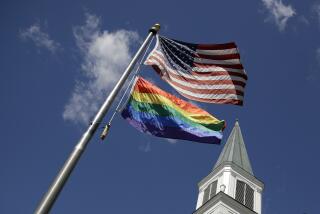Methodists OK Closer Ties With Other Groups
- Share via
DENVER — Representatives of the United Methodist Church, meeting here for the denomination’s quadrennial General Conference, voted this week to deepen ecumenical ties with a number of other Protestant denominations.
Church leaders also continued to debate the issue of homosexuality, which has stirred strong emotions in the 8.9-million-member denomination.
Delegates voted 661-288 to adopt a “covenanting proposal” of the Consultation on Church Union, a group that promotes closer ties between Methodists, Presbyterians and other Protestant groups.
The vote sets the stage for the 36,771 Methodist churches throughout the nation to begin holding joint worship services with certain other Protestant churches. Some administrative decisions on the local Methodist level must precede implementation of the plan, however.
“This is the most important decision we’ve made all week,” said Jean-Pierre Duncan, a delegate from Wyoming. “We worship the same God, so why can’t these churches do some more things together?”
The United Methodists are the sixth denomination to approve the COCU proposal.
While the COCU vote went smoothly, the issue of homosexuality continued to divide the meeting.
Tuesday’s 144-page edition of the Daily Christian Advocate, the conference’s official report, included a statement from the denomination’s council of bishops reaffirming the church’s traditional position that the practice of homosexuality is “incompatible with Christian teaching.”
“The council understands the present language in the ‘Book of Discipline’ to be a faithful expression of faith and discipleship,” said the statement, a response to one released to the media last week by 15 Methodist bishops who urged the church to allow ordination of practicing homosexuals.
In a press conference Tuesday, Bishop Woodie White of Indiana, president of the United Methodist Council of Bishops, explained why he helped draft the statement for the denomination’s approximately 130 bishops.
“Once the church has spoken, as bishops, it is our responsibility to teach and uphold what the church has spoken,” he said.
Methodist General Conferences have debated homosexuality every four years since 1972, and denominational delegates--who are responsible for deciding the church’s doctrines and policies--repeatedly have reaffirmed the church’s traditional position.
The bishops’ statement was greeted with relief by some delegates who had waited days for a response to last week’s dissenting statement. But it didn’t go far enough for Good News, an unofficial evangelical renewal movement within the denomination that called the council of bishops’ statement “woefully inadequate.”
Good News Publisher James V. Heidinger II criticized the bishops’ council for not denouncing what he called the “highly divisive action” by the 15 bishops.
“It appears to us our episcopal leaders have sacrificed the well-being of the church for the myth of episcopal unity and collegiality,” said Heidinger. “We believe this response . . . reflects an abdication of leadership on this controversial issue which is capable of dividing the church.”
More to Read
Sign up for Essential California
The most important California stories and recommendations in your inbox every morning.
You may occasionally receive promotional content from the Los Angeles Times.










